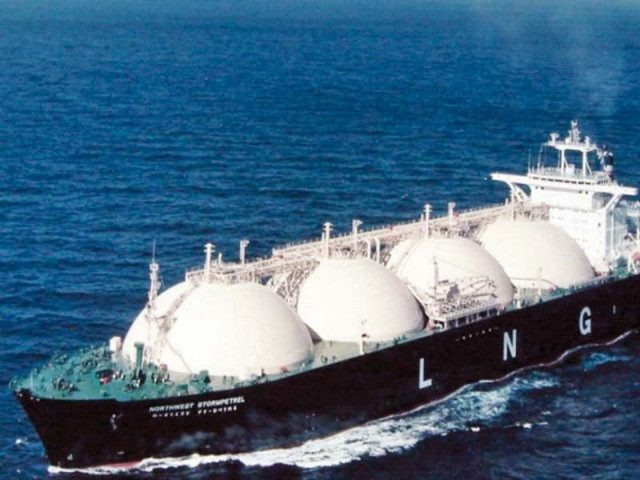Stirring controversy: Lobby of oil traders blamed for delay in LNG imports
Petroleum minister says oil lobby doesn’t want to see LNG imports replace furnace oil in production of electricity

PHOTO: AFP
“The oil lobby doesn’t want to see LNG imports replace furnace oil in the production of electricity,” this is what Abbasi said in remarks following the long delay in a smooth flow of LNG from Qatar.
The government has accorded high priority to supplying LNG to four power plants namely Saif, Halmore, Orient and Sapphire in Lahore as their agreement with Sui Northern Gas Pipelines Limited (SNGPL) for the provision of gas expired in 2009.
Since then, the plants had either been shut or running on expensive high-speed diesel. An injection of LNG will help the plants start functioning, but they are reluctant to give payment guarantees for LNG consumption.
Officials aware of the developments argue that operators of these plants looked content with the end of their gas supply deals with SNGPL as they were receiving capacity payments while operating the power units at sub-optimal levels.
Read: CNG industry utilising LNG to bear gas theft losses
The power plants were also the clients of a multinational oil company that supplies high-speed diesel to them and does not want to lose the business. Perhaps, the petroleum minister was referring to that oil company when he talked about the oil lobby.
The minister told a high-level meeting at the Prime Minister’s Office that talks with Qatar on LNG trade had reached a stalemate because of delay on the part of power companies in establishing a payment mechanism. It took many by surprise why the government failed to put in place the payment mechanism in the last two years when an LNG terminal was being built at the Port Qasim. Its focus was entirely on talks with Doha and did nothing to streamline things back home.
At present, the government is bringing LNG from Qatar through spot purchases. It has forced the private sector to import LNG through state-owned Pakistan State Oil (PSO), arguing private businesses have no marketing licence.
However, Engro’s LNG terminal and PSO also have not got any marketing licence from the Oil and Gas Regulatory Authority (Ogra), but they are continuously doing LNG business.
According to an agreement, a floating terminal was to be installed at the Karachi Port for re-gasification of LNG, but it is being used to bring gas from Qatar. No commercial LNG carriers are being used for carrying gas supplies.
A regulated market
The LNG supply was supposed to be a deregulated business, but gas utilities have taken control of the market and the government has put on hold the application of third-party rules.
The third-party access rules, framed by the previous government of Pakistan Peoples Party (PPP), allow private businesses to use the transmission and distribution network of gas utilities. But the government has brought the market under its control and tasked Ogra with notifying the prices.
LNG has even been declared a petroleum product to empower Ogra to announce prices every month.
This is aimed at minting money from the consumers, who are paying $12.50 per million British thermal units against the actual cost of $8. Additional revenues go into the accounts of gas utilities and PSO in the form of varying charges and margins.
The import price agreed with Qatar has also raised eyebrows. The petroleum minister told a parliamentary committee that the LNG price was linked with 14.5% of Brent oil rate. Qatar had made the same offer to the PPP government and later revised it downward to 14.25%.
Read: LNG terminal: Successful bidder's bank certificate found to be fake
All money from the consumers will go into pockets of the government and its enterprises in the name of margins and high LNG prices. Though the PML-N government takes pride in setting up the LNG terminal and starting gas imports, but these come at the cost of consumers and lead to controversies.
the writer is a staff correspondent
Published in The Express Tribune, June 15th, 2015.
Like Business on Facebook, follow @TribuneBiz on Twitter to stay informed and join in the conversation.



















COMMENTS
Comments are moderated and generally will be posted if they are on-topic and not abusive.
For more information, please see our Comments FAQ